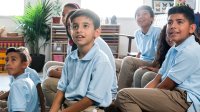Giving Students’ Empathy Muscles a Workout
A new platform helps teachers in different countries connect their classrooms and encourage an appreciation for different perspectives.
Fourth-grade teacher Jesse Ediger wants her digital learners to realize that they can tap into opportunities far beyond their hometown of Hutchinson, Kansas. “I want to draw back the curtain, show them the world, and let them see how connected they are,” she says.
Some 1,500 miles south in Maninalco, Mexico, English teacher Karina Cavazos Almaguer has similar hopes for her students. “I want them to have the self-confidence to investigate the whole world,” she says.
Using a new global education platform called Empatico, the two teachers recently started connecting their students for learning activities designed to foster empathy along with global awareness.
For their first videoconference in November, students talked about how they play. A conversation intended to last 20 minutes stretched to 45, as students compared not only favorite pastimes—ranging from kickball to Minecraft—but also wildly different weather patterns in Kansas and Mexico. “The kids were so enthusiastic,” Ediger says, “and they realized that we’re not so different after all.”
Matchmaking and More
Free for users, Empatico features standards-aligned lessons suitable for ages 8 to 10. Ediger and Almaguer chose a lesson called “Ways We Play” for their first interaction.
Like mini-projects, the lessons start with an entry event that partner teachers facilitate separately to spark inquiry and activate their students’ prior knowledge. Lesson plans scaffold the video conference with tips to encourage perspective taking and empathy building, and then wrap up with guided reflection activities in each classroom.
The platform includes a suite of technology tools. Once teachers sign up, Empatico handles matchmaking. A scheduling tool helps partner teachers find mutually convenient times to collaborate. Videoconferencing is built in, as well, to make connecting easier. Each class needs only a single computer with a camera to participate.
Developed as a $20 million initiative of the nonprofit The Kind Foundation (started by KIND Snacks), the platform aims to engage a million students by 2020. “Kids will have the chance to explore their similarities and differences, expand their horizons, and strengthen their empathy muscles,” explains Daniel Lubetzky, the entrepreneur and philanthropist who founded The Kind Foundation.
The focus on young children is deliberate. “If we can intercept students at this moment and give them opportunities to meaningfully interact with one another,” Lubetzky predicts, “we can create a lifetime of positive change.”
Seeing issues from others’ perspectives, communicating respectfully, and collaborating to solve problems are among the skills that Empatico aims to build early. Those goals echo what global education experts recommend as essential learning for today’s students.
Hungry for More
Ediger began emphasizing global education with her students a few years ago. “Our world is shrinking,” she says, and many elementary students are already exploring online on their own. “I want to be sure my students have digital literacy skills by the time they leave me.”
Ediger’s first foray beyond her own classroom was with an organization from Canada called Exploring by the Seat of Your Pants. It connects students via Google Hangouts with conservation scientists, explorers, and other experts. “My students could ask them questions. It was phenomenal, and the success of those experiences left me hungry for more. How else can I help my students explore the world?”
Ediger admits that connecting her students to the wider world “took a leap of faith at first. As teachers, it’s natural to want to be able to control everything in your environment. These experiences can seem unpredictable,” she admits. But repeat experiences have convinced her that “global education is where it’s at.”
Ediger and Almaguer are already planning their next shared experience, using an inquiry lesson called “Weather Out the Window.” It involves analyzing and interpreting data along with perspective taking and communication.
“We want to take this further,” Ediger says, noting that the two teachers have discussed doing a shared book study in the future. “We might read a novel together and exchange perspectives.”
For Almaguer, Empatico has provided a welcome opportunity for her elementary students to put their English skills to practical use. “They’re always asking me, ‘Why do we study English if we never get to talk to anyone [outside of class]?’” Her students were nervous when they began their first videoconference, the teacher says, “but they felt so proud after the call. The look on their faces said, ‘There’s a world outside here—and we can go for it!’”
Almaguer hopes that these global learning experiences will give her students “a new view for their lives.” Their community faces serious problems, she acknowledges, including drugs, alcoholism, and economic challenges. “We want to show them another view,” she says.
Learning activities that challenge students to compare and contrast their neighborhood with other places should help her students gain fresh insights about what makes their own community special. An Empatico lesson called “Community Cartographers,” for example, guides students to create maps of the cultural features and landmarks of their home region. They later explain those features during a videoconference with their partner classroom.
“Now my students are eager to investigate many things,” says Almaguer, with their new friends in Kansas as partners in learning.
